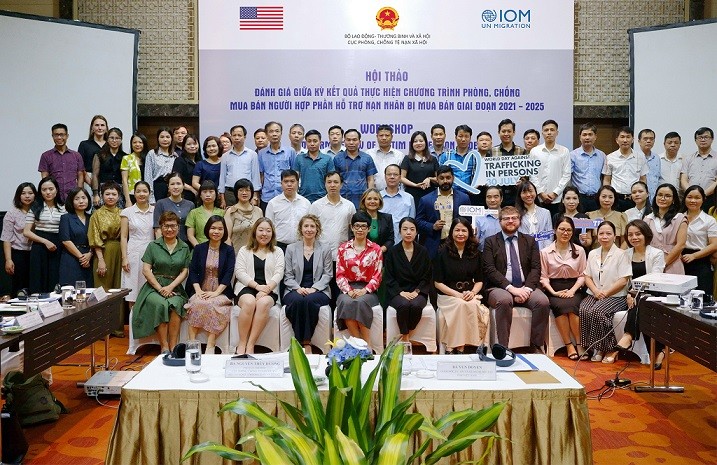
Mid-term Review Workshop on combating and preventing human trafficking
Latest
 |
| The Mid-term review workshop on victim protection under the National Plan of Action on Combating and Preventing human trafficking 2021- 2025 in Ho Chi Minh City. (Pho: NT) |
Policies for more effective victim protection
Nearly 200 participants representing central and provincial government agencies especially those working on victim protection, along with the representatives from embassies, academic institutions, international NGOs, and UN agencies attended the workshop series in Hanoi and Ho Chi Minh City.
All parties actively shared their respective assessments of the implementation and coordination for victim protection between 2021 – 2023, and identified the areas that could be improved in the remaining NPA period until 2025. In particular, the emphasis has been made on prioritizing areas that should be raised and considered for the planned legislative revisions and subsequential policy reviews.
IOM’s Chief of Mission, Ms. Park Mihyung, attended the review workshop in Ho Chi Minh City and commended the Vietnam Government’s unwavering dedication to tackling human trafficking as underscored by the US 2023 Trafficking-in-Persons (TIP) Report. She also highlighted MOLISA’s crucial role in their proactive engagement with other Ministries and agencies at central and provincial levels for streamlined coordination and referrals for more effective victim protection.
At the Workshop, the Ministry confirmed that 40 provinces now are piloting the Inter-Ministerial Guideline on Inter-Agency Coordination, which is expected to increase the number of trafficked victims identified and assisted as per the relevant legislations and NPA.
“As we look towards 2025 with a vision to 2030, we must use this moment to renew our commitment to the objectives of the National Human Trafficking Prevention and Control Programme and spare no effort in the next few years to accelerate its implementation.
IOM will continue to work with MOLISA and other partners to make this happen, to explore and test the reintegration support-service models that could maximize available resources and address the complicated and comprehensive needs of persons in vulnerable situations", Ms. Park Mihyung stated.
Ms Nguyen Thuy Duong, Deputy Director General of DSVP stated: “No single agency or country can effectively prevent and combat human trafficking without international cooperation. Therefore, the Ministry of Labour - Invalids and Social Affairs highly recognize the partnership and appreciates the active support of the International Organization for Migration (IOM) on human trafficking prevention and combat as well as victim protection and support. DSVP and IOM have recently developed a standard screening toolkit and a reintegration model, focusing on livelihood support for victims of trafficking and migrants in vulnerable situations".
"Leaving no one behind"
Since 2017, IOM has been supporting MOLISA and provincial partners to pilot and test various reintegration support models including a community-based reintegration model that had successfully supported 179 people through community self-help groups in Bac Giang, Hue, and Tay Ninh, as well as 550 people under combined models of individualized reintegration support and community-based models in Quang Binh, Ha Tinh and Nghe An.
Moreover, to leverage on community-based organizations for continued outreach as well as proactive referrals for victim identification and support, five One-Stop Service Offices (OSSOs) were established in partnership with Vietnam Women’s Union in five localities of Hanoi, Hai Duong, Hai Phong, Can Tho and Hau Giang.
Through partnership and strengthened coordination, progress has been made in victim protection, with more frontline officers and social workers trained with standardized tools and guidelines for streamlined assistance and referrals, leading to more people having been assisted.
Yet, as the tactics used by traffickers are getting more sophisticated, particularly with increasing fraudulent online recruitment practices that are more difficult to detect and disrupt, the number of trafficked victims and those in need of protection also continues to increase. There still remain areas to be discussed for improved implementation and updated policies.
“I strongly recommend the victim-centered approach for the national program to be more effective. We must place the victims of trafficking in persons at the heart of our policy making and planning agendas. Only when we can listen to the victims' stories and experiences can we build our policy and strengthen our system, leaving no one behind", Ms Park Mihyung concluded.
| On 9 February 2021, the Prime Minister issued Decision No. 193/QD-TTg approving the National Plan of Action against Trafficking in Persons (NPA) for the period 2021 – 2025 with a vision to 2030. In line with the NPA 2021-2025, MOLISA issued Decision 525/QD-LDTBXH to approve the Ministerial Implementation Plan of NPA 2021-2025, with a focus on victim protection and support (MOLISA Implementation Plan, dated 5 May 2021). |

















